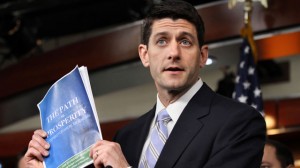
Rep. Paul Ryan holds up a copy of his budget plan entitled "The Path to Prosperity," during a news conference on Capitol Hill in Washington on Tuesday. (AP Photo/Jacquelyn Martin)
Remember the controversy last year over Rep. Paul Ryan’s (R-Wis.) 2011 budget that many believed would signal the end of Medicare? Earlier this week, the House Budget Committee chairman released his new budget plan, entitled “The Path to Prosperity.” Over the next 10 years, Ryan’s plan would cut spending by $5.3 trillion more than Obama’s proposed plan and overhaul the tax code by replacing the six current brackets with two — a top bracket of 25 percent (as opposed to today’s 35 percent) and a lower bracket of 10 percent. While Medicare and Medicaid get a trim, it’s not mainly about Medicare this time. This time it’s about cutting programs for the poor.
The Washington Post‘s Ezra Klein broke down the proposed spending cuts in a WonkBook blog post.
Over the next decade, Ryan plans to spend about 16 percent less than the White House on “income security” programs for the poor — that’s everything from food stamps to housing assistance to the earned-income tax credit. (Ryan’s budget would authorize $4.8 trillion between 2013 and 2022; the White House’s would spend $5.7 trillion.) Compared with Obama, Ryan would spend 25 percent less on transportation and 13 percent less on veterans. He’d spend 6 percent less on “General science, space, and basic technology.” And, compared with the White House’s proposal, he’d shell out 33 percent less for “Education, training, employment, and social services.”
Still, the spending cuts don’t go far enough for some. Tea Party Republicans said that they weren’t sure they would vote for it and the conservative Club for Growth rejected the budget yesterday, saying it takes too long to balance the budget (by 2040) and violates the Budget Control Act by ending automatic spending cuts. Republican presidential candidate Rick Santorum told Glenn Beck that although he thought it was a “great blueprint,” he would prefer a plan that cut spending more quickly. Mitt Romney called it “a bold and exciting effort.”
Some call Ryan’s plan a kind of reverse Robin Hood — slashing the safety net and passing on the savings to the rich. New York Magazine’s Jonathan Chait writes:
Poor people, or people who have a family member with a serious medical condition, come in for special abuse here. The Republican budget would repeal the Affordable Care Act, which provides health insurance coverage to 30 million people, and replace it with nothing. On top of that, it would absolutely slash Medicaid and the childrens’ health insurance plan, eliminating coverage from 14-27 million more people…
The Post‘s Dana Millbank says it’s not just about saving money. He says Ryan believes that hurting the poor is really the best way to help them in the long run. He writes:
“Ryan’s justification was straight out of Dickens. He wants to improve the moral fiber of the poor. There is, he told the audience at the conservative American Enterprise Institute later Tuesday, an ‘insidious moral tipping point, and I think the president is accelerating this.’ Too many Americans, he said, are receiving more from the government than they pay in taxes.
After recalling his family’s immigration from Ireland generations ago, and his belief in the virtue of people who ‘pull themselves up by the bootstraps,’ Ryan warned that a generous safety net ‘lulls able-bodied people into lives of complacency and dependency, which drains them of their very will and incentive to make the most of their lives. It’s demeaning.’
This view, that there is a culture of poverty, is certainly not a new idea. But it’s not clear that it will resonate with Americans in this election year. A Gallup poll released in November indicates a growing share of people have lost faith in the American Dream. The New York Times reports that 41 percent said that there was not much opportunity in America, up from 17 percent in 1998.

